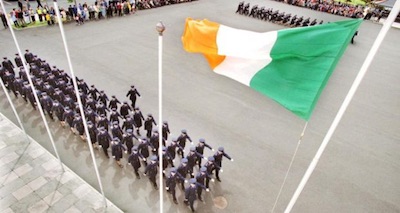
The staggering amount of surveillance being undertaken by the authorities in the 26 Counties has been revealed with more than one thousand new spy requests on citizens initiated every month.
Between 2008 and 2012, some 61,823 applications were made for unrestricted access to telephonic and internet communications in Ireland, spiking in 2010. The amount of surveillance being undertaken has since multiplied as new regulations now permit the examination of all stored electronic data through one single application.
The 26 County Gardai police made almost all of the requests, which require only the signature of a Garda superintendent and no judicial oversight.
The revelation comes on the back of a furore over the news that the scandal-plagued police oversight body, the Garda Siochana Ombudsman Commission (GSOC), had accessed the phone records of three mainstream media journalists. The GSOC said it examined the data in order to check on allegations that Gardai passed details of the 2007 death of model Katy French to tabloid newspapers.
Taoiseach Enda Kenny condemned the incident and said there was difference between this kind of incident and one where ‘national security’ was involved, without clarification.
Civil rights activists have linked the increase in Garda surveillance to the spread of the anti-austerity campaign and anti-water-charges protests across the state. A call has now been made by Independent TDs Clare Daly and Mick Wallace for a review of all legislation linked to surveillance, not just that involving journalists.
Ms Daly said there was a “certain double standard” in the outcry over the GSOC accessing of journalists’ phone records. She said this was entirely disproportionate when “citizens have had their phone conversations in prisons with solicitors tapped into, that gardai have been involved in such activity as well, largely unmonitored”.
Ms Daly pointed out that Garda abuse of public privacy, as alleged in the Katy French case, was a criminal activity.
“It is a huge problem that gardai are giving information to the press, information that is not often in the public interest but breaching the privacy of private citizens. It is very common but no action or accountability is taken.”
Any review of the legislation “has to be done in the interests of all citizens”, she added,
Mr Wallace said that before GSOC could look at anyone’s phone they should have to go to court, and so too should the Garda Siochana. “This idea that a garda can actually go to a superintendent or higher and get permission to interfere with someone’s communications facilities is just madness.”
Unlike most other western nations, there is no tradition of civil liberties in Ireland and little or no judicial oversight of the surveillance activities of the state authorities. People who suspect their data has been accessed can complain to a circuit court judge, but only after the records have already been accessed. Journalists have unsuccessfully argued they should at least be informed when their data is accessed.
In response to the controversy, and with a general election expected to be called as soon as next week, the Taoiseach announced on Thursday that a review of the legislation is to be conducted by retired Chief Justice Mr Justice John Murray -- but only in regard to Garda spying on journalists.
Fianna Fail’s Paschal Mooney accused him of “crocodile tears”, claiming an independent review “is kicking the can down the road” Mr Mooney said the government should accept a Fianna Fail bill which provides that any attempt to tap a telephone of a private citizen must go before a court.
Civil rights groups and Sinn Fein also condemned the restriction of the review of the legislation to journalists only.
“The Minister is engaged in an electioneering exercise to assuage a particular constituency that Fine Gael needs to court,” said Sinn Fein spokesperson Padraig MacLochlainn.
“It is a cynical attempt to head off criticism by the media of Fine Gael in the run-up to the election.
“The comment by Minister Fitzgerald that former Chief Justice Murray’s legislative review would “take too long” if it covered the snooping of the public’s communication records is only true from the point of view that an election is imminent.
“Like the closure of rural Garda stations and the reduction in Garda numbers, the government’s response to alleged abuse of snooping powers directly undermines confidence in the public’s police service.”
![[Irish Republican News]](https://republican-news.org/graphics/title_gifs/rn.gif)
![[Irish Republican News]](https://republican-news.org/graphics/title_gifs/harp.gif)

